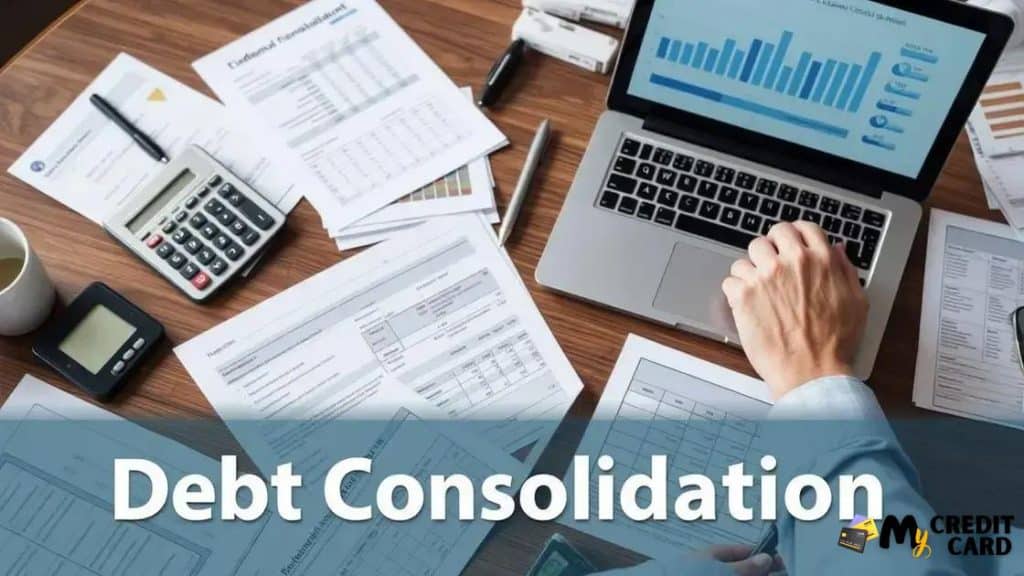Debt consolidation as a financial solution: How to regain control of your finances

Anúncios
Debt consolidation as a financial solution is more than just combining loans, it’s a lifeline for those drowning in multiple payments. If juggling bills feels exhausting, this approach could simplify your finances and bring peace of mind.
Imagine turning chaos into clarity with a single payment and a lower interest rate. Whether it’s credit cards, personal loans, or student debt weighing you down, debt consolidation can be your first step toward financial freedom.
In this guide, we’ll break down everything you need to know, from how it works to real-life success stories that prove it’s possible to regain control.
Anúncios
Understanding debt consolidation
Debt consolidation as a financial solution is designed to help people overwhelmed by multiple debts regain stability. It merges all your outstanding balances into one manageable payment. Instead of tracking several due dates and interest rates, you focus on a single loan, often with better terms.
This makes budgeting simpler and reduces financial stress. There are different ways to consolidate debt, like personal loans, home equity loans, or balance transfer credit cards. Each offers distinct benefits depending on your credit score and financial goals.
The key is understanding how this strategy fits into your broader financial picture. Done correctly, debt consolidation doesn’t just ease your monthly burden, it also puts you on a faster path to being debt-free.
Anúncios
But it’s not a one-size-fits-all solution. Knowing the details can help you avoid mistakes and choose the right type of consolidation for your unique situation.
Types of debt consolidation
Choosing debt consolidation as a financial solution means understanding the available methods. Each one comes with its own pros and cons, tailored to different financial needs.
Personal loans
Personal loans are the most common route for debt consolidation. You borrow a lump sum to pay off your debts and then repay it in fixed installments, usually at a lower interest rate than credit cards.
This option provides predictability, making it easier to plan your monthly budget. Plus, many personal loans come without hidden fees if you choose a reputable lender.
However, qualifying for the best rates typically requires a decent credit score. It’s crucial to shop around and compare terms before committing.
Home equity loans
If you own a home, a home equity loan can be a powerful debt consolidation tool. You borrow against your home’s equity, often unlocking lower interest rates compared to unsecured loans.
The advantage is the potential for larger loan amounts and extended repayment periods. This can significantly lower your monthly payments.
But remember, your home serves as collateral. Missing payments could put your property at risk, so this option requires careful financial planning.
Balance transfer credit cards
Balance transfer cards are ideal for consolidating high-interest credit card debt. These cards often offer 0% APR for an introductory period, giving you time to pay down debt without additional interest.
This option works best if you can commit to paying off the balance before the promotional rate expires. Otherwise, the interest may jump significantly.
Watch for transfer fees, which can be around 3% to 5% of the amount moved. Factor that into your decision when calculating total savings.

Benefits of debt consolidation
Using debt consolidation as a financial solution offers more than just convenience, it provides real financial relief. The benefits can be immediate and long-lasting.
Consolidating debts into one loan simplifies your financial life. No more juggling different payment dates, varying interest rates, or worrying about missed deadlines.
A major perk is the potential for lower interest rates. This reduction can save you hundreds or even thousands over the life of your loan, freeing up money for savings or other goals.
Another key advantage is stress reduction. Instead of feeling overwhelmed by debt, you gain a clear, manageable repayment plan that fits your lifestyle.
Key advantages of debt consolidation
Debt consolidation as a financial solution can positively impact both your wallet and your mental health. One major benefit is predictable monthly payments with set interest rates.
This stability allows you to plan your finances better and avoid surprises. It also improves your cash flow, especially if your previous debts had high interest rates.
Over time, successfully managing a consolidation loan can boost your credit score. Lower credit utilization and consistent payments show lenders that you’re financially responsible.
Plus, with fewer payments to track, you reduce the risk of late fees or penalties, helping protect your credit profile even further.
How to choose the right plan
Finding the best debt consolidation as a financial solution depends on matching the right plan to your unique situation. It starts with evaluating your total debt and your current financial standing.
List all your outstanding balances, interest rates, and monthly payments. This gives you a clear picture of how much you’ll need to consolidate and what terms will work for you.
Then, check your monthly budget. Knowing how much you can realistically afford helps you choose between shorter terms with higher payments or longer terms with lower payments.
Evaluate your options
When comparing consolidation plans, interest rates are a crucial factor. Lower rates mean less money spent on interest over time.
Pay attention to loan terms as well. A shorter loan term often comes with higher payments but saves you more in the long run, while a longer term reduces monthly costs but increases total interest paid.
Also, review fees carefully. Some loans include origination fees, balance transfer fees, or early repayment penalties. Always read the fine print to avoid surprises.
Finding the right lender
Your credit score plays a big role in securing the best terms. Higher scores unlock better rates, while lower scores may limit your options or increase costs.
Take the time to research lenders. Look for institutions with positive reviews, transparent terms, and solid customer support.
A trustworthy lender will clearly explain fees, loan terms, and repayment expectations. This ensures your debt consolidation journey leads to long-term financial stability.
Common pitfalls to avoid
Using debt consolidation as a financial solution can be transformative, but there are pitfalls that could derail your progress if you’re not careful.
A common mistake is falling back into old habits after consolidating. Once credit cards are paid off, it’s tempting to use them again, which can lead to even more debt.
Make a plan to avoid unnecessary spending. Treat your cleared credit lines as closed until your consolidation loan is fully repaid.
Overlooking fees
Not all consolidation plans are created equal. Some come with hidden fees like origination charges or balance transfer fees that eat into your savings.
Always review the loan agreement carefully. Look for a lender that offers transparent terms without excessive or surprise fees.
Even small fees can add up, reducing the overall benefit of consolidation if you’re not paying attention to the details.
Common pitfalls to avoid
When considering debt consolidation, it’s important to be aware of common pitfalls that can lead to further financial trouble. Recognizing these traps can help you make better decisions.
One major pitfall is taking on additional debt. After consolidating, some people feel relieved and may start using credit cards again, leading to an increase in overall debt. It’s crucial to stick to your budget and avoid unnecessary spending.
Ignoring a budget
The biggest danger is not changing the habits that led to debt in the first place. Without a solid budget, you risk missing payments, damaging your credit, or ending up in deeper debt.
A realistic, sustainable budget is essential. Track your spending, set clear financial goals, and prioritize paying off the consolidation loan consistently.
Staying disciplined ensures that debt consolidation works as a lasting solution, not just a temporary fix.
Choosing the wrong plan
Choosing a consolidation plan without understanding its terms can lead to problems. Each option has different interest rates, repayment terms, and impacts on your credit score. Make sure to compare options before making a commitment.
Before finalizing a debt consolidation plan, consider your personal goals and circumstances. Consulting with a financial advisor can also help you avoid these common pitfalls and chart a solid path toward financial recovery.
Real-life success stories
Real people prove that debt consolidation as a financial solution truly works. Their experiences show that with the right approach, financial freedom is within reach.
Take Sarah’s story. She was drowning in over $30,000 in credit card debt. A personal loan helped her cut her interest rate in half, making her payments manageable and her financial future brighter.
John faced a similar struggle. He combined multiple credit card balances using a 0% APR balance transfer card. By staying disciplined, he cleared his debt within the promotional period, saving thousands.
Maria’s success
Maria was overwhelmed by student loans and personal debts. A home equity loan allowed her to consolidate everything into one low-interest payment.
Not only did she lower her monthly obligations, but she also improved her credit score over time. Maria’s disciplined approach kept her on track until she was completely debt-free.
These success stories highlight that anyone can turn financial stress into financial strength. The key lies in choosing the right consolidation method and sticking to a clear repayment strategy.
Debt consolidation as a financial solution isn’t just about simplifying payments, it’s about reclaiming control over your financial future. Whether you choose a personal loan, home equity loan, or balance transfer, the right plan can lower stress, reduce interest, and help you become debt-free faster.
By understanding the options, avoiding common pitfalls, and learning from real-life success stories, you set yourself on a path toward lasting financial stability.
Ready to make the change? Start exploring debt consolidation today and take the first step toward financial freedom.
FAQ – Frequently Asked Questions about Debt Consolidation
What is debt consolidation?
Debt consolidation is the process of combining multiple debts into a single loan, often with a lower interest rate to simplify payments.
How can debt consolidation benefit me?
It can lower your monthly payments, simplify your finances by reducing the number of payments, and potentially improve your credit score over time.
What types of debt can be consolidated?
You can consolidate various types of debt, including credit card debt, personal loans, and medical bills.
Are there any risks associated with debt consolidation?
Yes, risks include taking on additional debt, fees from consolidation loans, and potential impacts on your credit score if not managed properly.





